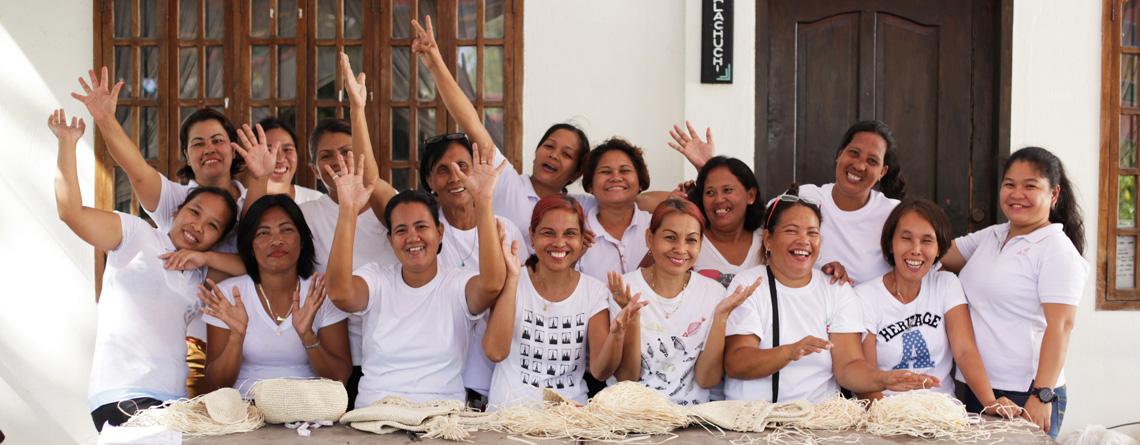Japanese Bag Manufacturer Empowering Women in the Philippines by Teaching New Skills and Providing Fair Wages
Building on a local palm-leaf weaving tradition, bag maker Sulci employs Filipino women to crochet their high-quality goods, providing reliable incomes while teaching new skills

TOKYO, March 12, 2019 – Japanese raffia bag manufacturer Sulci joins Business Call to Action (BCtA) with a commitment to provide new skills and reliable incomes to working mothers in the Philippines by teaching crocheting and providing 100 jobs to women living in Carcar City, Cebu Island, by 2020.
Launched in 2008, BCtA aims to accelerate progress towards the Sustainable Development Goals (SDGs) by challenging companies to develop inclusive business models that engage people with less than US$10 per day in purchasing power (in 2015 dollars) as consumers, producers, suppliers and distributors. Over 220 companies, ranging from multinationals to social enterprises, and working in 70 countries, have responded to BCtA by committing to improve the lives and livelihoods of millions in developing countries through access to markets, financial services, affordable healthcare, water and sanitation, education and other critical services.
Sulci aims to open up a way for Philippine women to increase their financial independence by mastering a skill that can be performed anywhere, with only basic materials and equipment. Sulci’s bags are carefully crocheted from naturally-grown local palm-leaf fibre, raffia, using a single crochet hook. As crocheting requires little in terms of equipment, the financial outlay for women to take up this profession is low, while the flexible nature of the skill means they can either work from the workshop or from home, and adapt it to fit their lifestyles, working as much or as little as they like. In addition, as the fibres are natural, they are more environmentally friendly than synthetic materials such as plastic.
Sulci pays its crocheters a fair wage, which means they are able afford home essentials like food and power as well as healthcare and education for their children, increasing their economic independence. Having the freedom to work from home when needed also gives them the flexibility to balance their home duties such as childcare and housework with their work for Sulci.
Sulci was created when founder and CEO Satomi Sekiya visited the Philippines in 2010. She met many women who wanted to work but could not find jobs. Sekiya saw an opportunity to develop a business that would create fashionable and in-demand bags for Japanese customers while at the same time providing these women with an opportunity to develop a new skill that would allow them to generate a reliable income.
Based on its success, in 2015, Sulci expanded its training to include female inmates at Carcar City Jail, providing inmates with an opportunity to earn money to send to their families. At moment about 10 of Sulci’s crocheters are the inmates. Sulci also plans to introduce a crocheting course into the home economics class of junior and senior high schools in Carcar City, with a view employ the graduates.
In addition, it established the Sulci Fund - three percent of crocheters’ wages are contributed to the fund and can be accessed if they need special support such as purchasing glasses, rice, educational materials and medical treatments.
“We are creating beautiful products that are very much in demand in Japan; they are sold in major department stores and we sell about 400 bags per month in the high season. But at the same time, we are enabling our female crocheters to experience financial independence in a way they have not been able to before, giving them the freedom to choose whether they pay for better education for their children, buy more domestic livestock, improve their homes or whatever is a priority for them,” said Sekiya.
“Sulci’s model is an inspiring one – what started as an idea to improve the lives of Filipino women while creating a great product has grown into a much wider reaching initiative that is transforming the lives of women and girls in Carcar City,” said Paula Pealaez, Head of Business Call to Action.
For further information:
BCtA: aimee.brown@undp.org
BCtA membership does not constitute a partnership with its funding and programme partners, UNDP or any UN agency.
About Business Call to Action (BCtA): Launched at the United Nations in 2008, BCtA aims to accelerate progress towards the Sustainable Development Goals (SDGs) by challenging companies to develop inclusive business models that offer the potential for both commercial success and development impact. BCtA is supported by the Dutch Ministry of Foreign Affairs, Swedish International Development Cooperation Agency (Sida), Swiss Agency for Development and Cooperation (SDC), UK Department for International Development (DFID), and hosted by the United Nations Development Programme (UNDP). For more information, please visit www.businesscalltoaction.org.
About Sulci: Sulci, which means “hand crafted” in old Cebuano language, is a Japanese bag manufacturer which trains and employs women in Carcar City in the Philippines to create its bags by crocheting natural raffia palm leaf fibres. Its inclusive business model aims to provide fair wages to the women it employs, enabling them to lift themselves and their families out of poverty.
